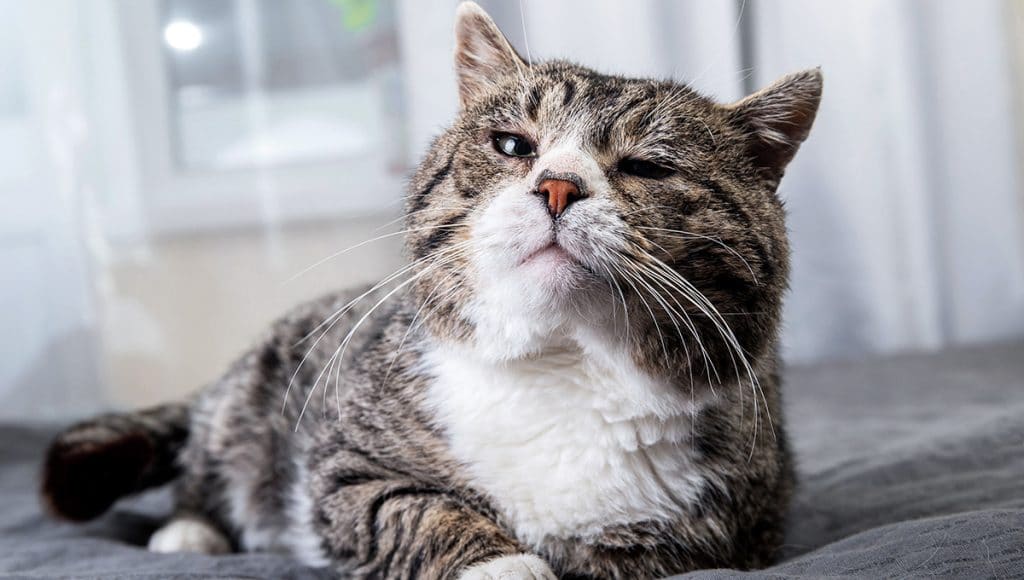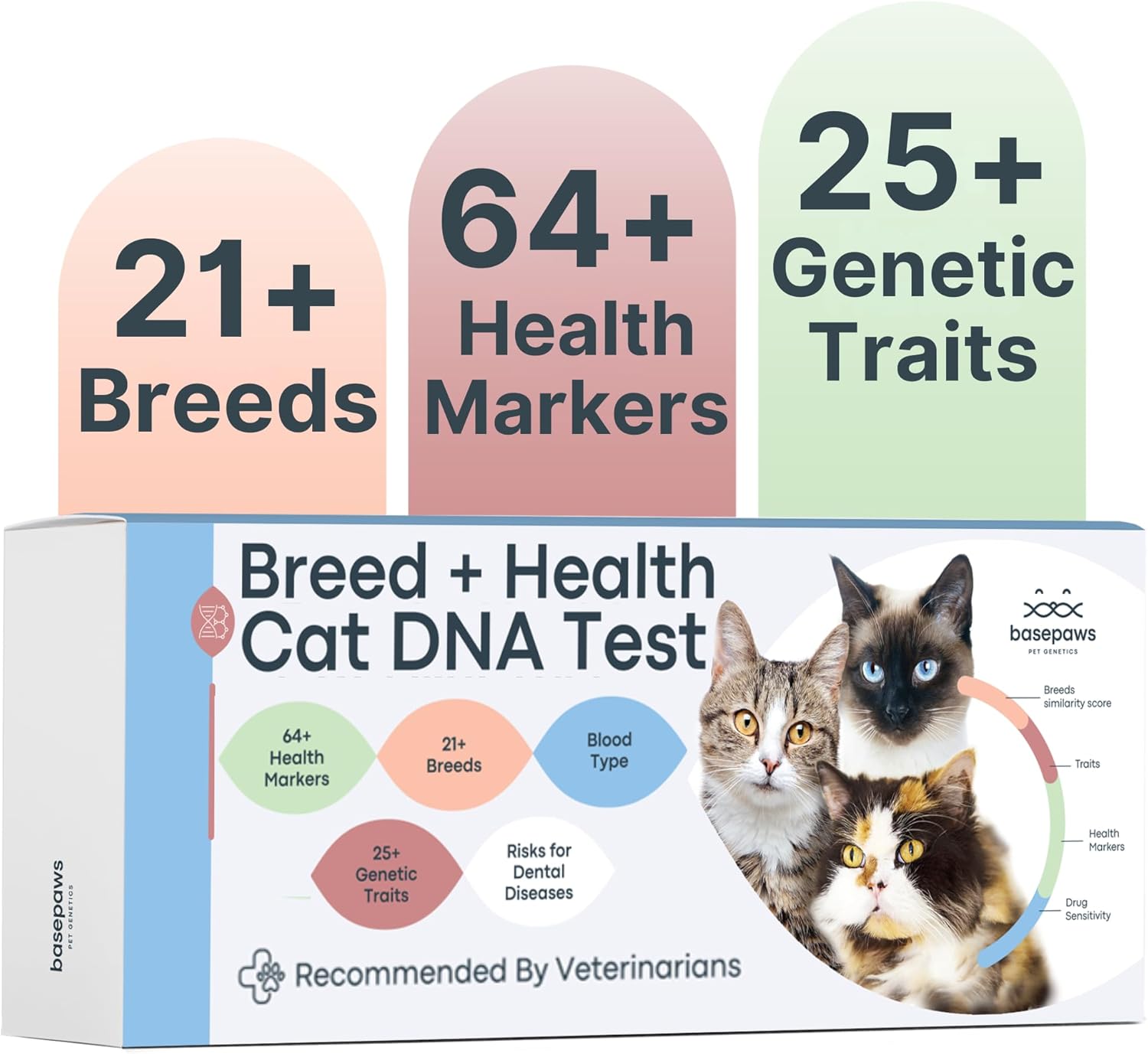- This post contains affiliate links. Read more here.
- Not a substitute for professional veterinary help.
Wondering about your cat’s breed or genetic makeup? Increasingly popular, at-home cat DNA test kits offer insight into your cat’s breed composition, physical traits, and genetic markers for disease. Fans say they offer a deeper understanding of your cat and even help you plan for their medical future.
They’re not cheap—most cost between $90 and $130—but they are easy to use. All you have to do is swab the inside of your cat’s cheek and send in the sample. After 4 to 6 weeks, you’ll be able to view a report of your cat’s test results online.
The level of detail you get and the kinds of insight you can expect to learn will depend on the brand you choose. “They’re not 100% definitive,” Dr. Hyun Han, a veterinarian at TelaVets, caveats. But they can be used as a conversation starter with your vet to make more informed decisions about your cat’s care.
Here’s what to know before you buy, plus a breakdown of the best cat DNA kits on offer and how to use the data you get back.
The Best Cat DNA Tests on the Market
| Basepaws | Wisdom Panel | |
| Breeds identified (#) | 21 | 70 |
| Health markers(#) | 64 | 45 |
| Genetic traits (#) | 50 | 25 |
| Cost | $89.99 | $129.99 |
| Wait time | 4-6 weeks | 2-3 weeks |
| Reviews | 4.2 / 5 stars on Amazon
Over 2,100 reviews |
4.2 / 5 stars on Amazon
Under 500 reviews |
Basepaws
Basepaws launched its first cat DNA test kit in 2018. The company currently offers three different testing options, including a basic dental screening kit and whole genome sequencing. Basepaws’ most popular product, the Breed + Health Cat DNA Test, analyzes your cat’s similarity to four breed groups (21 distinct breeds) as well as their genetic markers for certain health conditions and physical traits.
All three Basepaws test kits include an oral swab used to take a 5-second sample of your cat’s saliva. Results are usually delivered within 4-6 weeks, at which point you can view them online and have them sent directly to your veterinarian.
Rover product testers gave their Basepaws experience four paws up, noting that Basepaws’ breed analysis focuses more on regional breed groups than Wisdom Panel but offers more detailed insight in terms of genetic health markers and physical traits.
Wisdom Panel
While Wisdom Panel’s first dog DNA tests required a blood draw, the company transitioned to direct-to-consumer cheek swab tests in 2009. It wasn’t until 2021, however, that the brand released its first cat DNA test: Wisdom Panel Complete for Cats.
Like the Basepaws kits, Wisdom Panel’s cat DNA test requires an oral DNA sample. Instead of taking a simple swab of saliva, however, the test uses cheek cells. Pet parents must swab the inside of their cat’s cheek for at least 15 seconds then give the swabs 5 minutes to dry.
While sample collection is a little more involved for Wisdom Panel than Basepaws, results are generally available after just 2-3 weeks instead of 4-6. Wisdom Panel’s reports include 70 distinct breeds (compared to 21), though some users report conflicting results with known lineage. Compared to Basepaws, Wisdom Panel’s database for genetic health and physical trait markers is more limited, and the test doesn’t include dental screening.
Runners Up
When it comes to cat DNA tests, Basepaws and Wisdom Panel are far and away the most popular among pet parents. There are some other options available, including tests that are marketed specifically toward breeders and veterinarians:
- Orivet – In addition to My CatScan complete DNA health and trait screen, Orivet offers screenings for individual genetic health and phenotype markers. Breeders can shop individual tests by breed or purchase a full breed profile for around $120.
- EasyDNA – Offers several tests similar to Basepaws and Wisdom Panel as well as diagnostic tests for feline polycystic kidney disease (PKD) and intolerances to food, environmental factors, and artificial allergens.
- Koko Genetics – Choose from a basic or advanced cat DNA test that provides details about your cat’s breed ancestry as well as physical traits and genetic health markers.
While companies like these offer similar products, their databases of feline genetic samples are less robust than Basepaws’ and Wisdom Panel’s. That can be a problem, since a large data pool is crucial for improving the accuracy of cat DNA tests.
Of the runners up, Orivet is likely the strongest—especially for cats with documented pedigrees. Orivet’s genetic screenings were developed using published research rather than breed-specific genetic studies, however, which can negatively impact accuracy.
Are Cat DNA Tests Accurate?
According to Dr. Han, “The accuracy [of cat DNA tests] varies depending on the company and how large their genetic database is.” They’re fairly accurate for general ancestry and health screening, but they shouldn’t be considered definitive.
The best tests, Dr. Han says, come from companies that have invested in feline genetic research and have collected thousands of DNA samples. After all, these tests work by comparing the genetic markers in your cat’s DNA against those in a database. The bigger the database, the more valuable the results.
Cat DNA tests can provide useful insights such as:
- Breed composition. Inferences about the specific breeds or regional breed groups that make up your cat’s ancestry.
- Physical traits. Specific genes that contribute to your cat’s appearance, including details like coat length, color, texture, or pattern.
- Health risks. Genetic markers for specific diseases which may indicate an increased risk of future health issues.
What a cat DNA test won’t tell you
Cat breeds are a lot less genetically distinct than dog breeds. That’s largely because cats were domesticated much more recently than dogs—8,000 years ago compared to 14,000 to 40,000 years ago. And development focused on specific traits in cats only began about 150 years ago.
The result? A cat DNA test could tell you whether your cat shares more genetic similarities with breeds developed in one region over another. For example, you might learn that your cat is more closely related to Eastern cat breeds like the Burmese and Oriental Shorthair than to Western breeds like the Norwegian Forest Cat and Ragdoll.
But for lots of domestic cats, you probably won’t get a clear-cut breed breakdown.

Aleksandr Zotov/iStock
Can Cat DNA Tests Warn You About Health Issues?
Health assessments are where cat DNA tests can really shine—and maybe change the way you approach your cat’s care.
Based on the specific genetic markers identified in your cat’s DNA, their test results could give you clues about future health risks. “Certain breeds are more likely to carry genetic conditions,” Dr. Han explains. Early feline genome sequencing suggests some breeds are genetically predisposed to neurological disorders like spinal muscular atrophy (SMA) or eye problems like progressive retinal atrophy (PRA). Persian cats and some related breeds, for example, have demonstrated an increased risk for polycystic kidney disease (PKD).
“These health screenings can be informative,” says Dr. Han, “especially when they flag known mutations linked to disease.” However, just because your cat has a certain gene doesn’t mean they’ll definitely get the disease. It just indicates a higher risk.
Dr. Han recommends going over the results with your veterinarian to decide whether to change anything in your cat’s routine or if you should monitor for certain symptoms over time.
Benefits of Cat DNA Testing
Wondering whether you should do a cat DNA test? For most cat parents, it depends on what you’re hoping to gain from it. For those simply hoping to learn more about their cat (and have fun doing it), a cat DNA test can be a great investment. You might even gain insight into potential future health issues that can help you be a more responsible caretaker for your cat.
On the flip side, cat DNA tests might not be useful if you’re hoping to build a detailed feline family tree. Or use the results to make breeding decisions. Dr. Han adds that your cat’s test results might not change anything in terms of care if they’re a typical domestic shorthair with no unusual health issues.
As things currently stand, cat DNA tests are marketed as a novelty—a fun way for pet parents to learn more about their cat. But the science behind them isn’t strong enough yet to consider the results conclusive.





